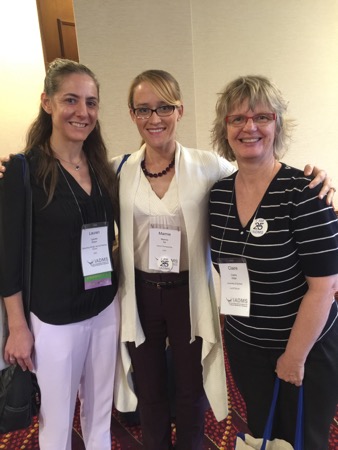The International Association for Dance Medicine and Science held their 25th annual meeting in October at the Marriott City Center in downtown Pittsburgh, PA. Starting off with a day for teachers, the gathering spanned a four-day period that offered networking opportunities, information-sharing, and an overall sense of purpose that was clear and heartfelt.
As a first-time attendee, I thought I’d share some thoughts on the meeting with those who may be interested, and those who might want to consider going in the future. After all, next year’s meeting is in Hong Kong, which would make a lovely trip!
I have to say that I really enjoyed my time with this unique group of professionals, and felt the experience was definitely worthwhile. As most of you are already aware, I’m very passionate about the topic of dance wellness, and I’d love nothing more than to see IADMS continue to grow and connect with dancers and dance teachers everywhere.
So…here are some thoughts on the experience from my perspective, along with a few photos that should give a little context to my narrative.
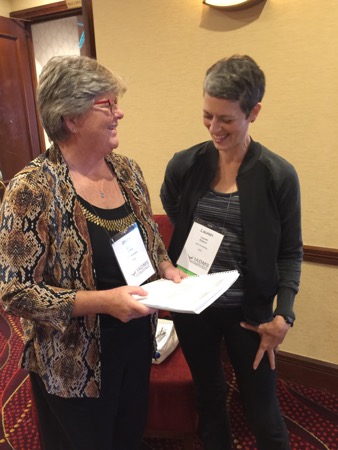 Networking
Networking
Without question the single largest benefit to attending this meeting is the networking. The IADMS gathering brings professionals together from all over the world, giving them a chance to compare notes, talk dance medicine, and, perhaps most importantly, get to know one another.
Even with the magic of connecting via the web, there is just no substitute for face-to-face interaction. To that end, I enjoyed having the chance to meet the members of our own Dance Wellness Panel in person for the first time, and I couldn’t have been more pleased with the planning time we had to solidify topics we’ll share with readers throughout the year (stay tuned!).
Although IADMS is smaller gathering of professionals than conferences such as Dance USA and the Dance Teacher Summit, it actually works to the advantage of the organization in this case. It simply felt much easier to connect with people here. Faces became familiar after a day or two, and because of that, it made approaching people less intimidating–even for a somewhat introverted person, such as myself.
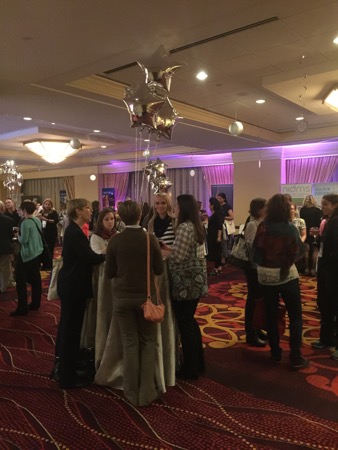 Several events were incorporated into the meeting’s overall framework that allowed participants the chance to just relax and mingle a bit. Among these were the welcome reception Friday evening, and the “dance party” on Saturday night.
Several events were incorporated into the meeting’s overall framework that allowed participants the chance to just relax and mingle a bit. Among these were the welcome reception Friday evening, and the “dance party” on Saturday night.
Information
The information presented at the IADMS meeting fell into three primary formats: lectures, movement sessions, and poster presentations. There were also a number of tables on-hand from various supporters and exhibitors. To try and summarize everything offered is quite an impossibility, so an overview of the main categories is offered here instead…each with a few examples…
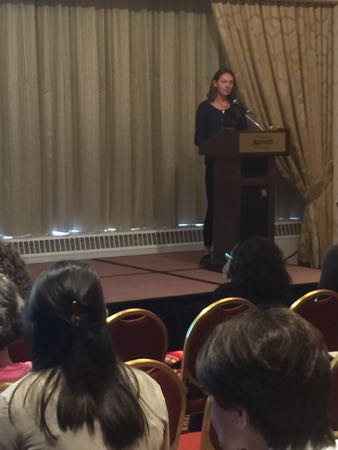 Lectures
Lectures
Throughout the event there were numerous lectures available for attendees to take in — from “Nutritional concerns in vegetarian and vegan dancers“ to “The science of motor learning: creating a model for dance training” to “Anterior hip pain in a dancer – an alternative diagnosis.”
Injury prevention/treatment, teaching strategies, metabolism, and dancer fitness were just some of the topics addressed by professionals from the podium. Lecture sessions were typically brief and specific, with accompanying slides. Following each lecture there was an opportunity for questions/comments.
Poster Presentations
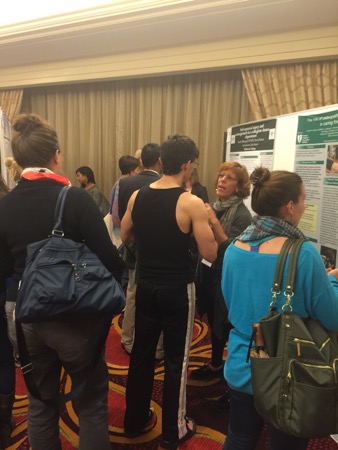 Poster presentations offered another approach in terms of information sharing and engagement. Posters were displayed in a room where attendees could peruse them and discuss ideas with one another at a leisurely pace. These sessions were lively, and many people took advantage of the opportunity to join in the conversation.
Poster presentations offered another approach in terms of information sharing and engagement. Posters were displayed in a room where attendees could peruse them and discuss ideas with one another at a leisurely pace. These sessions were lively, and many people took advantage of the opportunity to join in the conversation.
There were two poster presentation slots during the span of the meeting, and a wide range of topics were covered, such as, “Differences in sway area observed in ballerinas en demi pointe and en pointe,” “Can textured insoles improve ankle proprioception and performance in dancers?” and “Building a safe environment for private dance sectors: a business model to provide healthcare for dancers.”
Movement sessions
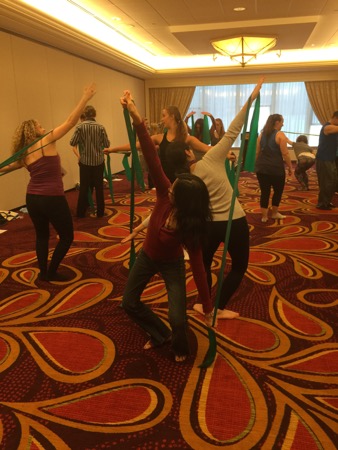 In addition to the posters and lectures, the IADMS meeting also provides numerous “movement sessions” where participants have the chance to explore thoughts and ideas in a more “hands-on,” active environment.
In addition to the posters and lectures, the IADMS meeting also provides numerous “movement sessions” where participants have the chance to explore thoughts and ideas in a more “hands-on,” active environment.
Some of the movement sessions included: “Using technology for movement analysis in the dance studio,” “Incorporating conditioning into a modern dance technique class,” and “Gaga, Ohad Naharin’s movement language,” among many others.
Unlike the lecture sessions which are generally rather short in length, the movement sessions typically run about 50 minutes, giving attendees the chance to dig in a bit and try some things out for themselves.
Camaraderie
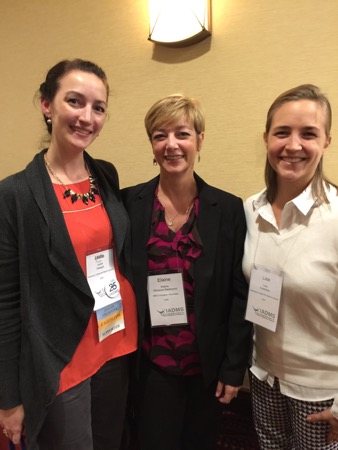 In my time at the meeting I met a wide range of educators, students and dance medicine professionals — from seasoned, founding members of the field — to brand new faces just joining the ranks after graduation.
In my time at the meeting I met a wide range of educators, students and dance medicine professionals — from seasoned, founding members of the field — to brand new faces just joining the ranks after graduation.
It was wonderful to see such a large span of ages and experience levels in attendance, and exciting to think about the possibilities that bringing this group of people together offers to the dance community throughout the world.
For more information on IADMS, please visit their website, and be sure to keep an eye on their blog. Those hoping to attend the 26th annual meeting in Hong Kong can keep an eye out for details on the site, and membership information is there as well.
Disclosure: 4dancers attended the 25th annual meeting on a press pass granted by IADMS, but no monetary compensation was received for coverage of the event. All transportation, lodging, and meals were paid for by 4dancers.





